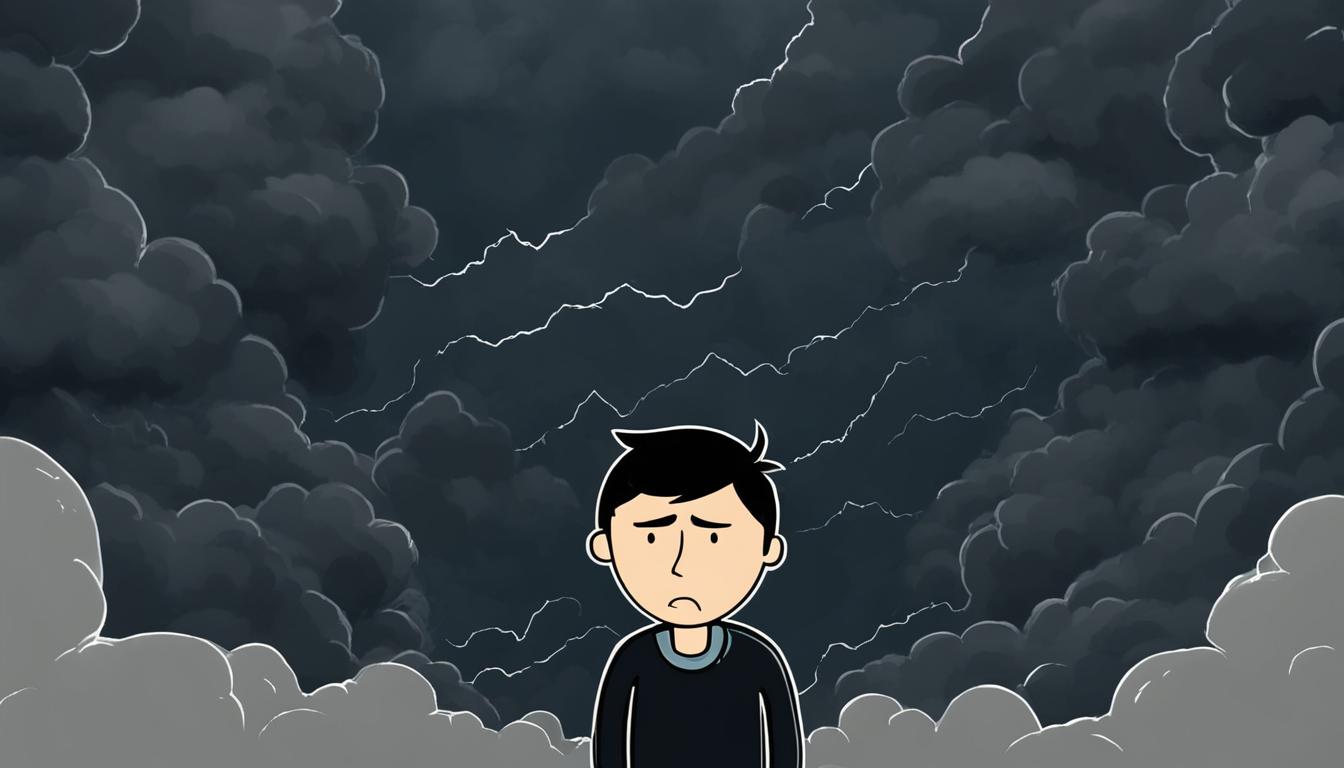I gaze upon the world with pessimistic eyes,
Where shadows cloak the sun-kissed skies.
A chronic negative thinker, they say I am,
Embracing a mindset others find a sham.
A negative outlook, a familiar trait,
I see the thorns, but not the roses in the crate.
They label me a pessimist, a term well-known,
But my thoughts wander in a realm of their own.
For some, my perspective may bring them down,
Like a wilted flower in a bustling town.
But I must acknowledge, it’s not all in my mind,
A negative thinker, a trait not easy to find.
The chronic negative thinker, a modern-day muse,
Unveiling truth in a world that’s confused.
Yet, I’m aware of the weight it bears,
On mental health and rosy affairs.
So let’s not be quick to judge and condemn,
For within the shadows, a lesson may stem.
Understanding the power of perspective’s sway,
A journey to embrace a brighter day.
Synonyms for a Person Who Always Thinks Negatively
When it comes to describing individuals who constantly have a negative outlook, the English language offers a plethora of colorful synonyms. These terms vividly capture the essence of their pessimistic mindset and tendencies. Let’s explore some of these evocative words:
- Defeatist: A defeatist is someone who always expects failure and focuses on the impossibilities rather than the possibilities. Their defeatist attitude can be disheartening to those seeking encouragement and hope.
- Killjoy: With their perpetually negative disposition, a killjoy can put a damper on even the most joyous of occasions. They bring everyone down with their constant criticism and lack of enthusiasm.
- Cynic: Cynics possess a skeptical and distrustful view of people and their motives. They expect the worst in others and are often seen as disbelieving and emotionally detached.
- Alarmist: Alarmists have a knack for blowing things out of proportion. They sensationalize every situation, causing unnecessary panic and distress among those around them.
- Wet Blanket: The term “wet blanket” perfectly captures the effect a negative thinker has on others. Like a dampened blanket, they can extinguish the enthusiasm and positivity in any situation.
- Mope: A mope is perpetually downcast and gloomy. They emit an aura of sadness and tend to bring everyone’s spirits down with their constant state of despondency.
- Spoilsport: A spoilsport is someone who ruins the enjoyment or excitement of others through their negative attitude and actions. They can turn a fun-filled occasion into a dreary experience.
- Complainer: As the name suggests, complainers are individuals who continuously voice their grievances and dissatisfaction. They focus on what’s wrong rather than seeking solutions or finding silver linings.
- Fatalist: Fatalists have an unwavering belief that everything is predetermined and that nothing they do can change the outcome. This fatalistic perspective often results in a defeated and passive approach to life.
Remember, these terms are more than just words. They paint a vivid picture of the mindset and impact a negative thinker can have on themselves and those around them. It’s important to be mindful of our own thoughts and strive for a more positive outlook to create a harmonious and uplifting environment.
| Synonym | Definition |
|---|---|
| Defeatist | Someone who always expects failure and focuses on the impossibilities rather than the possibilities. |
| Killjoy | Individuals who bring everyone down with their constant criticism and lack of enthusiasm. |
| Cynic | Persons who possess a skeptical and distrustful view of people and their motives. |
| Alarmist | Those who sensationalize every situation, causing unnecessary panic and distress. |
| Wet Blanket | Individuals who can extinguish the enthusiasm and positivity in any situation. |
| Mope | People who emit an aura of sadness and tend to bring everyone’s spirits down with their constant state of despondency. |
| Spoilsport | Those who ruin the enjoyment or excitement of others through their negative attitude and actions. |
| Complainer | Individuals who continuously voice their grievances and dissatisfaction. |
| Fatalist | People who have an unwavering belief that everything is predetermined and that nothing they do can change the outcome. |
Common Cognitive Distortions of Negative Thinkers
In the realm of negative thinking, a myriad of cognitive distortions color their perceptions, leading to the amplification of negative patterns. These distortions, such as filtering, polarization, overgeneralization, discounting the positive, catastrophizing, and blaming, play a pivotal role in shaping their mindset.
Filtering, the act of selectively highlighting the negatives while disregarding the positives, taints their view of reality. Like a grayscale filter on life’s vibrant canvas, they often fail to perceive the beauty and goodness amidst the challenges and struggles they encounter.
Polarization, a mental state devoid of nuance, pushes negative thinkers into rigid black-and-white thinking. Everything is framed as either good or bad, leaving no room for the shades of gray that exist in between. This extreme perspective further exacerbates their negative outlook, blinding them to the complexity and diversity of experiences.
Overgeneralization, another common cognitive distortion, involves making sweeping negative conclusions based on isolated negative events. Like a solitary raindrop seen as an unremitting storm, negative thinkers struggle to distinguish between specific instances and generalize their negative experiences, reinforcing their pessimistic beliefs.
Discounting the positive, a distortion that undermines the value of positive aspects, cloaks negative thinkers in a perpetual shadow. They dismiss uplifting moments and favorable outcomes, rendering them insignificant or mere flukes. This discounts the potential for positive change, perpetuating their negative thinking patterns.
Catastrophizing, the art of magnifying potential problems to cataclysmic proportions, sends negative thinkers spiraling into an abyss of worst-case scenarios. Like a cracked mirror distorting their reality, they jump to catastrophic conclusions, heightening their anxiety and perpetuating their negative mindset.
Blaming, the tendency to attribute negative experiences to external factors, absolves negative thinkers of personal responsibility. Like a scapegoat consuming their self-awareness, they fail to introspect, hindering personal growth and perpetuating their negative cycle.
Understanding these cognitive distortions is crucial in breaking free from the chains of negative thinking. By recognizing and challenging these patterns, individuals can pave the way for cultivating a more positive mindset, embracing the beauty and potential that life has to offer.
Source Links
- https://wordselector.com/what-do-you-call-a-person-who-always-thinks-negatively/
- https://www.verywellmind.com/is-it-safer-to-be-a-pessimist-3144874
- https://psychcentral.com/lib/cognitive-distortions-negative-thinking









